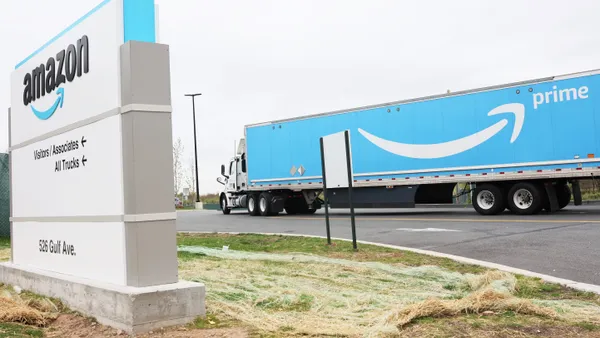Dive Brief:
- Convoy has fully automated its brokering process for loads, including matching and pricing, on select lanes in top markets including "Atlanta, Boston, Dallas, and Los Angeles, among others," the company announced in a press release emailed to Supply Chain Dive.
- The company's ability to automate the pricing process is the result of an improved price forecasting model along with new options like direct-to-shipper load bidding, which allows Convoy to infer the correct market price "once we have a couple of different data points," Convoy Chief Product Officer Ziad Ismail told Supply Chain Dive.
- The automated pricing works in two ways. Convoy will compute a price and a carrier can select any load at that price. Alternatively, the carrier can name their price on a load through the bidding process. Convoy's model will use these bids and load selections to understand where the market is heading, update itself as needed and take one of the bids. "All of that can be done now through the app without calling anybody at Convoy," Ismail said in an interview.
Dive Insight:
For Convoy, getting to automated pricing and matching has been an accumulation of steps over the company's four years in operation, Ismail explained. The company had to make the app attractive for drivers to use with features like automated detention. Once shippers and drivers started using the app it allowed Convoy to begin collecting the data it needed to train the models that are now automating the brokering process.
"Technology is improving the economics of trucking by eliminating the simpler, less value-added transactions and automating them, which means that logistics should become better, faster, cheaper," Michael Zimmerman, a partner at A.T. Kearney, said in an interview. "So I think that's the general takeaway is that automation can be a good thing when it works and we want to see more of it."
Shippers and carriers care about this shift toward automation, Zimmerman said. "And everybody should care," he said. "The shippers care because they want to be assured of high service with a low probability of mistakes or damage, etc."
Convoy announced it had reached automated matching in top markets this past February, which was the first step in fully automating the brokerage process. The next step was pricing.
The process has not been completely automated in all parts of the country where there is lower shipment density because there is less data to train the models, Ismail said. Convoy didn't say what level of automation it had reached at a national level, but said it is "ramping up" and automated loads are happening across the country.

The top markets where fully automated brokering has been achieved have higher volume, "which means we have the most data and so our pricing model is most accurate as well as we have the densest network of carriers," Ismail said.
The density of the freight market is what "drives the automation," he said.
"If you have really sparse data, say they only do one shipment per week ... there are going to be fluctuations all the time," Ismail said. "But if you're doing hundreds or thousands of shipments per day you're quickly going to detect if something is changing in that market and you can adjust your prices."
It's not just density that determines how well the model performs. The freight market can change quickly as the result of weather or other unexpected impacts.
When the market changes quickly, the "models have to catch up, they have to learn," Ismail said. "And historical data isn't going to be worth as much because the market is operating under very different conditions." Convoy has worked on making its model more responsive to sudden changes and focused on driving down its error rate, he said.
"If they can get to 100% of their loads being 100% automated then they need 0% people and they can basically take over the whole market," Zimmerman said. "That's not going to happen because there are still many aspects that are pretty complicated."
There are hundreds of variables that could complicate the automation process, from the dimensions of a truck to the temperature of a shipment, he said.
Convoy, Uber Freight and even legacy brokers like C.H. Robinson are increasingly focusing on automation as one of their largest expenses is the people making the calls, according to Zimmerman.
Convoy's brokerage operation team totals about two dozen people. As fewer loads require assistance in the form of phone calls and emails they will begin to shift their focus to scouting out new lanes and markets for Convoy to operate in. Convoy is focused on expanding into markets where it can find a lot of shipments, Ismail said.













